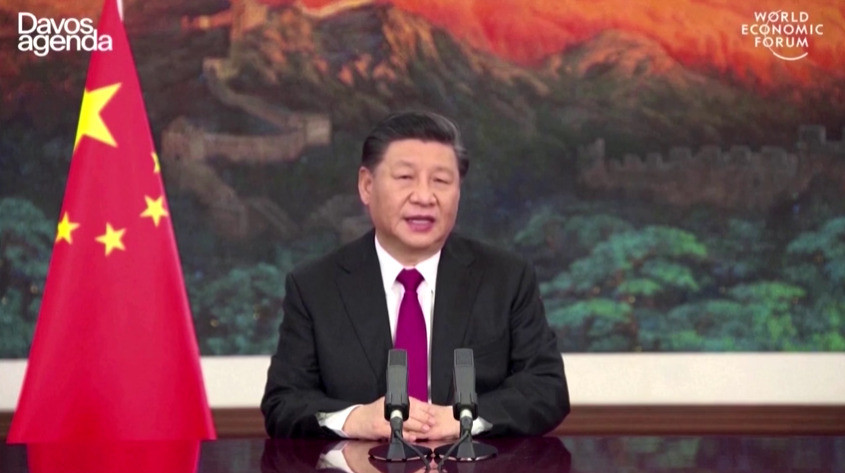Popular Reads
Top Results
Can't find what you're looking for?
View all search resultsPopular Reads
Top Results
Can't find what you're looking for?
View all search resultsChina may soften diplomacy to be 'reliable' nation
In recent years, the Communist-led government has adopted a hard-line attitude toward some democratic nations over its alleged human rights abuses against the Muslim Uyghur minority in Xinjiang and security challenges posed to Taiwan and its vicinity.
Change text size
Gift Premium Articles
to Anyone
S
peculation is rife that China may begin to take a softer approach to other nations including Japan in the wake of President Xi Jinping's pledge to "strive to shape a reliable, admirable and respectable image" of the country.
In recent years, the Communist-led government has adopted a hard-line attitude toward some democratic nations over its alleged human rights abuses against the Muslim Uyghur minority in Xinjiang and security challenges posed to Taiwan and its vicinity.
But Xi said at a ruling party meeting that China should "enlarge the circle of friends who understand" it, the official Xinhua News Agency reported, days ahead of Friday's 32nd anniversary of the crackdown on the Tiananmen Square democracy protests.
At the gathering held on Monday, Xi was also quoted by the news agency as stressing "the need to have a profound understanding of how important and necessary it is to improve the country's international communication."
In order to achieve the objective, Xi "called for carrying out people-to-people exchanges" and "cultivating capable professionals for international communication," Xinhua said.
A diplomatic source in Beijing told Kyodo News that Xi's remarks "can be translated as a sign that China would shift its diplomatic stance down the road," as its ties with many other nations have been souring while Sino-U.S. tensions have remained high.
China and the European Union have been at odds over the Xinjiang issue since the regional bloc, along with the United States, Britain and Canada, imposed coordinated sanctions against the Asian country earlier this year.
Relations between China and Australia also deteriorated particularly after Canberra called early last year for an independent review into the origins of the novel coronavirus, first detected in the central Chinese city of Wuhan in late 2019.
As for Japan, China has been irritated by its neighbor since Prime Minister Yoshihide Suga confirmed with US President Joe Biden at their summit in Washington in April "the importance of peace and stability across the Taiwan Strait."
It marked the first time in 52 years that Japanese and U.S. leaders have mentioned Taiwan in a joint statement.
Immediately after the summit, the Chinese Foreign Ministry summoned a senior official of the Japanese Embassy in Beijing to lodge a protest against the agreement between the United States and its close security ally in Asia.
A Japanese scholar familiar with Sino-Japanese ties said, "Taiwan is a core interest of China, so Japan should not have touched on it at the summit with the United States, if it has been seriously considering how to get along with the Asian power."
In February, China also enforced a controversial law enabling its coast guard to use weapons when foreign ships involved in illegal activities in waters it claims do not obey orders, already making Sino-Japanese relations fragile over maritime security.
As China claims that the Japanese-administered Senkaku Islands in the East China Sea are part of its territory, fears are mounting in Tokyo that the legislation would target Japanese vessels navigating around the uninhabited islets called Diaoyu in China.
China has frequently sent official ships to waters around the Senkakus to assert its claim to them, while Washington and Tokyo have agreed that the islands fall under the scope of a Japan-US security treaty.
The source, however, said Xi has become aware that China may face "isolation" from the international community, should it continue to take its aggressive "wolf-warrior diplomacy."
As its ties with the United States have shown few signs of improving since Biden took office in January, China could start extending an olive branch to some countries, given that diplomatic isolation "would hurt its political and economic interests."
The Global Times, a tabloid affiliated with the Communist Party, said Wednesday, "China is not a country that loves promoting itself to other nations, and it doesn't like playing tit-for-tat with others and prefers to treat others with kindness."
At home, meanwhile, China has indicated that it would concentrate on easing public concern over the future by implementing measures to narrow the social and economic gaps, in an apparent bid to prevent a recurrence of a similar incident to the Tiananmen protest.
The Chinese Communist Party has decided to permit married couples to have a third child, state-run media reported Monday, in a major policy change to grapple with the country's negative effects of the low birthrate.
China's population has been aging, due largely to its "one-child policy" introduced in 1979. It was scrapped in 2016 as worries grew that a rapidly aging population would constrain economic expansion.
Although the government has permitted all married couples to have a second child since then, China has not seen a baby boom.
"To encourage Chinese couples to have a number of children, Xi's leadership should fundamentally reform the country's social security system and provide a safe environment to raise a family," a source close to the Chinese government said.
"In China, young people have been even struggling to buy a house with real estate prices constantly rising, while they have to pay too much money to support the aging society. They have become frustrated with the Communist Party," the source said.
The latest shift in China's demographic policy underscores Xi's eagerness to develop the nation's pension, medical and welfare systems, which would be welcomed by young citizens, whether or not the birthrate will actually increase," he added.










